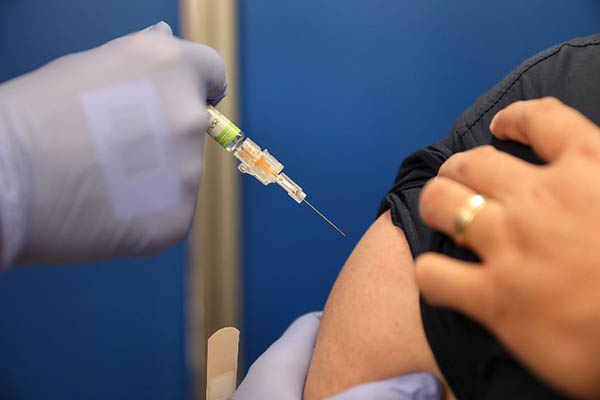
Joe Raedle-Getty Images North America—AFP
PakVac, produced from concentrate of CanSino, releases 120,000 doses in first batch packaged within the country
The Drug Regulatory Authority of Pakistan (DRAP) on Tuesday approved the Pfizer-BioNTech COVID-19 vaccines for “emergency-use” in the country after receiving 100,000 doses of the life-saving drug through the COVAX regime.
According to DRAP officials, the vaccine has been registered by Pfizer Pharmaceuticals, and the government would fix a price for its private sale later. The COVAX facility, which offers free doses of various coronavirus vaccines to low- and middle-income nations, sent the first batch of 100,000 doses of Pfizer’s vaccine to Pakistan last week, with the government announcing it would procure 1 million additional doses.
The Pfizer vaccine, per officials of DRAP, would be used for citizens between the ages of 12 and 20; for people traveling to Saudi Arabia for Haj; for immuno-compromised individuals; and for women over 40 who could not be administered the AstraZeneca vaccine.
PakVac
Also on Tuesday, the government officially launched the PakVac vaccine, which has produced 120,000 doses from the concentrate of the single-dose CanSino vaccine. Organized the National Institute of Health in Islamabad, the launching ceremony was attended by Planning Minister Asad Umar, Special Assistant to the P.M. on Health Dr. Faisal Sultan, NIH Executive Director Maj. Gen Aamer Ikram, and Chinese Ambassador Nong Rong.
Addressing the ceremony, Ikram said 120,000 doses were ready for use and the concentrate to produce 900,000 more doses had already been procured. He claimed the government hoped to produce up to three million doses of the vaccine every month, adding that efforts were underway to also indigenously produce the raw materials for it.
Ambassador Nong Rong, meanwhile, hailed the Pak-China relationship’s in helping the two countries “win the war” against the pandemic. “Pakistan was the first country on whom China gifted the vaccine and it [has] remained on our priority list,” he added.
Dr. Sultan noted that it was “not easy” to produce a vaccine from its raw material, adding that authorities had stressed quality assurance and hoped to be able to manufacture their own vaccines in the coming years. The planning minister, who also heads the National Command and Operation Center overseeing the national coronavirus response, urged the public to avail vaccines, noting that the pandemic could not be eradicated unless sufficient numbers had been inoculated.
